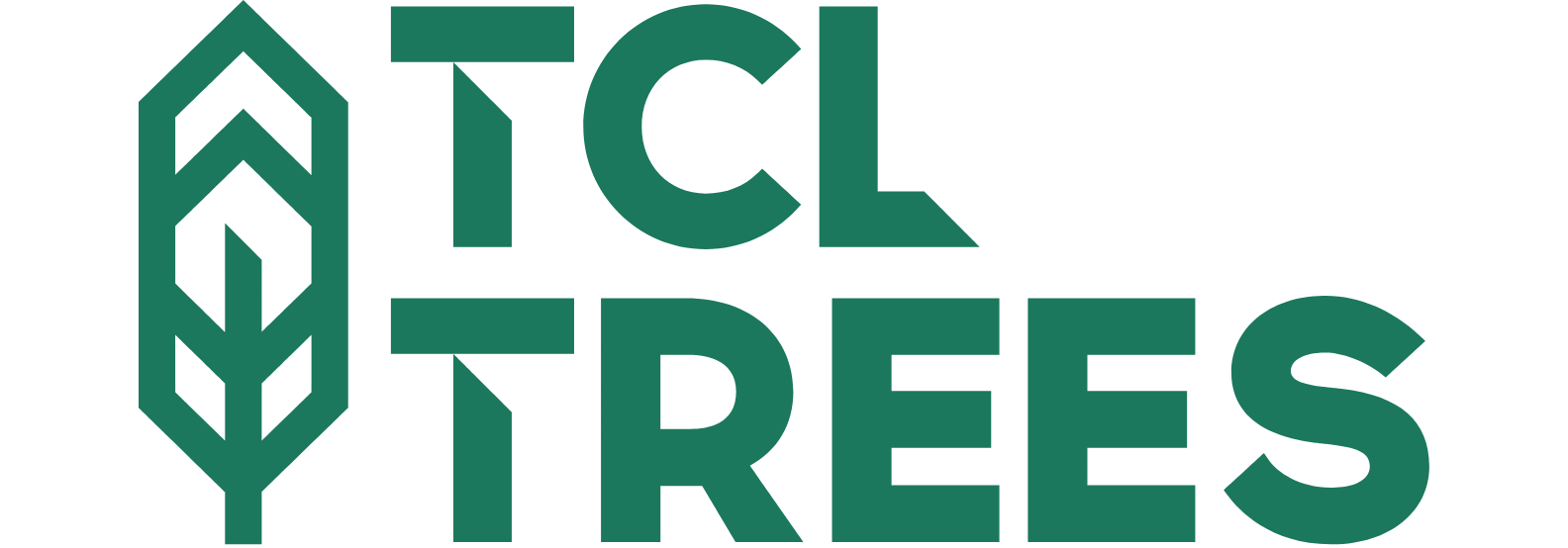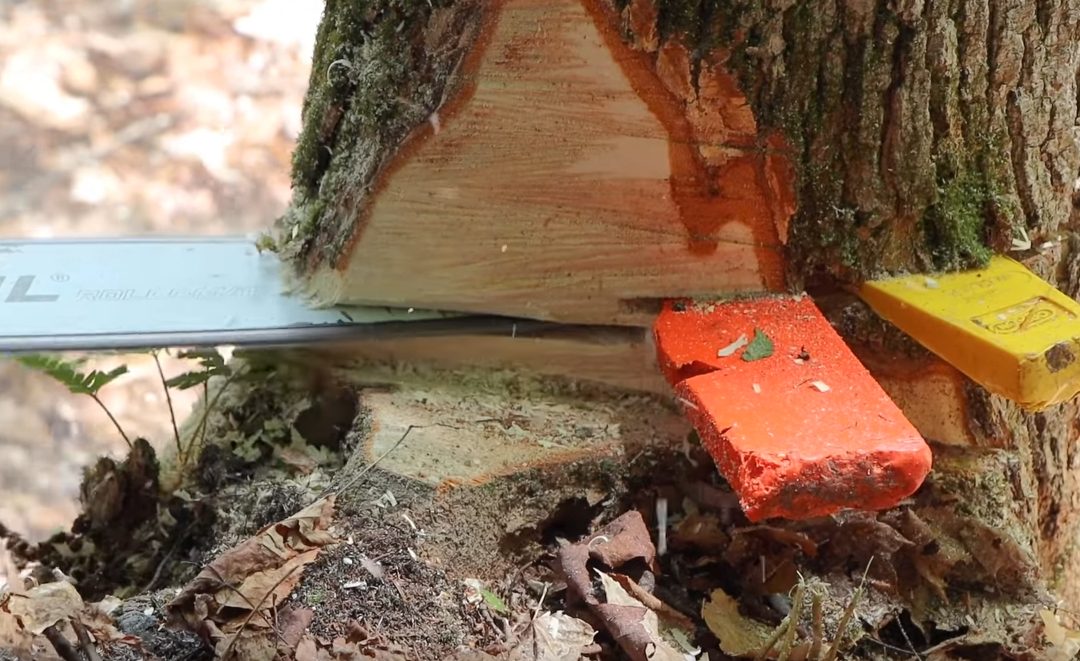Introduction
If you’re trying to get rid of a tree on your property, you’ve got a few options. You could cut it down yourself, hire a professional tree service, or use a chemical tree removal technique. Each approach has its own pros and cons, so it’s important to weigh your options carefully before making a decision.
In this article, I’ll discuss the pros and cons of the various tree removal techniques so you can decide which one is right for you. I’ll discuss cutting down the tree yourself, hiring a professional service, and using chemical tree removal techniques. By the end of this article, you’ll have all the information you need to make an informed decision.
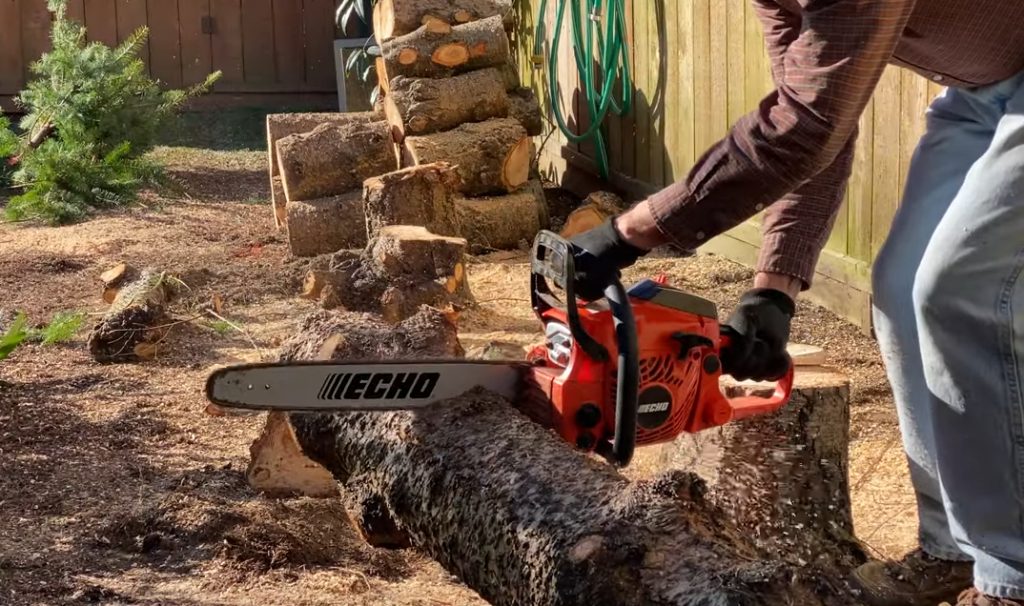
Traditional Tree & Stump Removal
Traditional tree removal is one of the oldest methods used to remove trees from a landscape. This method involves cutting down the tree, and then cutting the tree into manageable pieces. It includes the use of tree pruning, cutting, and trimming to safely remove the tree, as well as stump removal to ensure the tree is completely gone.
When I think about the pros and cons of traditional tree work, the first thing that comes to mind is the cost. Cutting down a tree is a labor-intensive task, and it requires special tools and equipment to do it safely. Although it is a more affordable option than other methods, it can still be expensive depending on the size of the tree and the length of time it takes to complete the job.
Another factor to consider is the amount of time it will take. Traditional tree workcan be a time-consuming process, and depending on the size of the tree, it may take several days to remove it completely. This can be a problem for those with limited time or limited labor resources.
The final thing to consider is the risk of damage to property or injury to people. Cutting down a tree is a dangerous task, and accidents can happen if it is not done correctly. It’s important to use the right safety precautions and to have the right tools and equipment when attempting a tree removal.
Although traditional tree work has its pros and cons, it is still a popular choice for many homeowners and landscapers. With proper planning and care, this method can be a safe and cost-effective way to remove a tree. To move onto the next tree removal technique, crane-assisted tree removal, let’s take a look at the potential advantages and disadvantages.
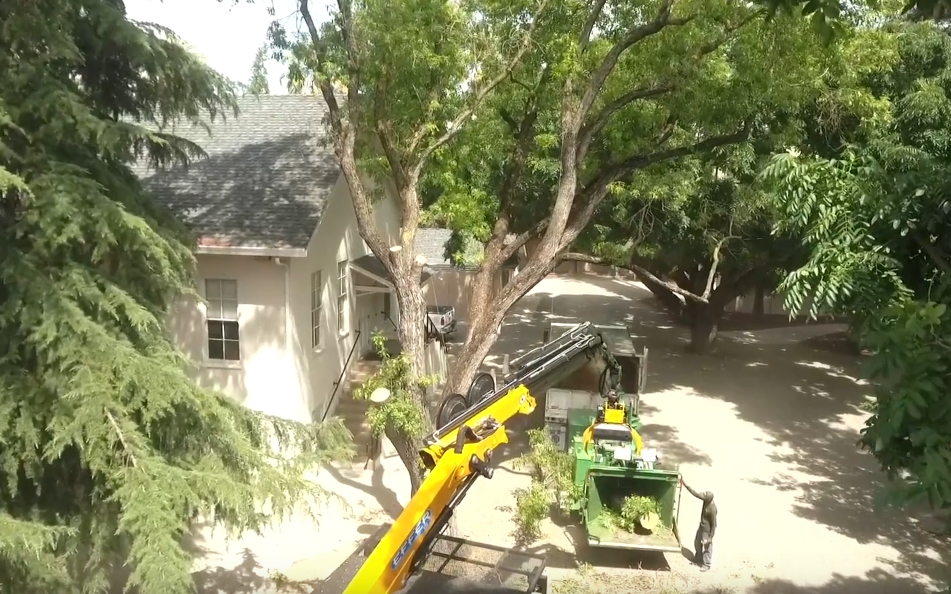
Crane-Assisted Tree Removal Methods
When it comes to tree removal and stump removal, sometimes traditional methods just aren’t enough. This is where crane-assisted tree removal comes in. With this technique, tree services are able to safely and efficiently remove large trees and other obstacles.
This method requires a specialized crane, which is equipped with a large claw-like device. The crane is used to grip and lift the tree branches and trunk, which can then be moved to a designated area. This is often a much faster and easier way to remove a large tree, and it can be done with minimal disruption to the surrounding environment.
The downside to this method is that it’s expensive and requires a lot of specialized equipment. It can also be dangerous, as the crane can cause significant damage if it’s not operated correctly. Additionally, this method is not suitable for removal of trees and stump removal in tight spaces, such as a backyard or a park.
If you’re considering crane-assisted tree removal, it’s important to consult with a qualified tree services specialist. They will be able to assess your situation and help you decide if this is the right option for you. With their expertise, you can be sure that the job will be done safely and efficiently.
Having a better understanding of crane-assisted tree work can help you make an informed decision about your tree maintenance. It’s important to weigh the pros and cons of each method to determine which one is best for you and your situation. To move on to the next step, let’s take a look at tree climbing and removal.
Arborist Tree Climbing And Removal of Trees
Tree climbing and removal is an effective way to take down a large or difficult tree. It requires a trained arborist to safely climb the tree and then remove it in sections. This technique is often used for trees that are too large for crane-assisted tree work. It is also used for trees that have the potential to cause damage if dropped from a crane.
Tree climbing and removal can be a time-consuming process. An arborist report may be needed to determine the best approach for removing the tree. The tree may then need to be sectioned, which means it will be taken down in pieces. This can be a lengthy affair, as the arborist must ensure that the tree is taken down in a safe and controlled manner.
Once the tree is down, the tree stump will need to be removed. This can be done through a stump removal process called stump grinding. Stump grinding involves using a specialized machine to grind the stump down to a few inches below the surface. This process can take anywhere from a few minutes to a few days depending on the size of the tree.
Tree climbing and removal is a great way to safely take down a large or difficult tree. It requires the help of an experienced arborist, and it may take some time to complete. However, it can help to keep your property safe from potential damage and keep your trees looking beautiful. Furthermore, it can also help to reduce the hassle of dealing with a tree stump, as stump grinding can help to remove the stump quickly and efficiently.
Now that you know the pros and cons of tree climbing and removal, let’s take a look at the other tree removal techniques.
Tree Removal Techniques Services – Pros & Cons
Tree removal is an integral part of many landscaping projects, and there are a few different techniques you can use to fell a tree. Understanding the pros and cons of each can help you decide which method is best for your project.
The first technique is tree felling. This involves cutting down a tree from the bottom and allowing it to fall in a predetermined direction. This is a great option if you have a large tree that needs to be removed quickly, but it can also be dangerous if the tree isn’t cut correctly.
Another option is pruning tree branches. This involves cutting away dead or unhealthy branches to restore the tree’s natural shape. It’s a great way to keep a tree healthy, but it can be difficult to remove large branches without damaging the tree.
Finally, you can also hire a professional tree removal service. This is the safest and most efficient way to remove a tree, but it can also be the most costly. If you’re looking for a cost-effective option, then pruning or felling the tree yourself may be your best bet.
No matter which technique you choose, it’s important to consider the pros and cons of each before you begin. Taking the time to plan ahead can help ensure that your project goes smoothly and that the tree is removed safely. With the right approach, you can have a beautiful yard in no time.
Next, we’ll take a look at tree work safety.
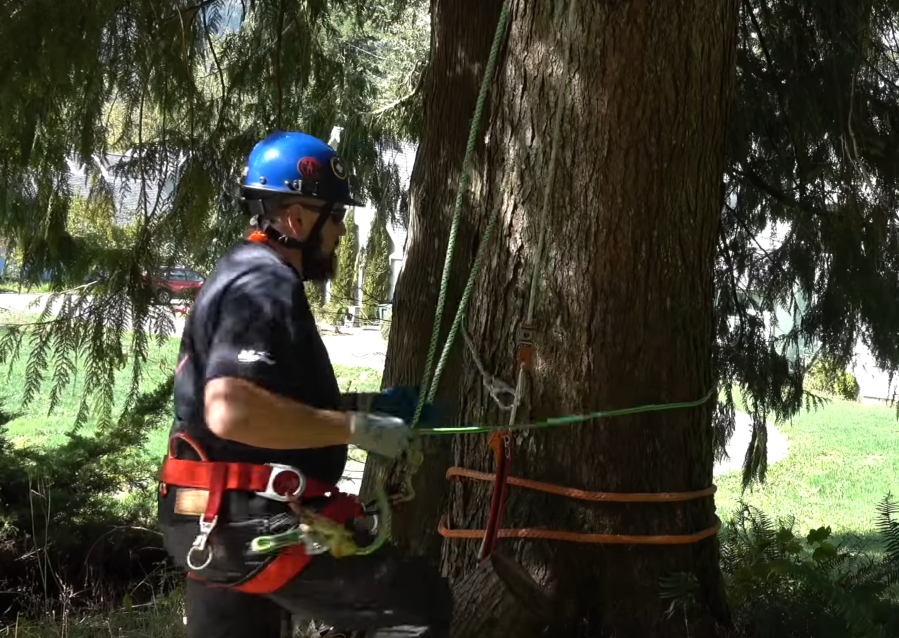
Tree Removal Safety Method Decision
When it comes to tree removal, safety is always the top priority. There are a few precautions you should take before you start the process of removing a tree. First and foremost, you should always make sure you’re wearing the appropriate safety gear. This includes eye protection, gloves, and a hard hat. It’s also important to know your limits and to be aware of your surroundings. If the tree is close to a power line or a building or home, it’s best to leave it to the professionals.
In addition to wearing the right safety gear, it’s also important to know the proper techniques for removing a tree. If you’re using a chainsaw, make sure you read the manual and understand the basics of how to operate it. Even if you feel comfortable using the saw, it’s always a good idea to have someone else around to help out. They can spot any potential hazards and help you stay safe.
When it comes to tree removal, it’s always a good idea to be prepared. Make sure you have the right tools and safety gear, and that you know the proper techniques for removing a tree. Taking the necessary precautions will help to ensure that the job is done safely and efficiently. And that’s the best way to move forward with your project.
Without further ado, it’s time to look into hiring a professional tree service company. The experts can handle the project with ease and provide the best possible results.
Hiring A Professional Tree Services Company
When it comes to tree removal, one of the smartest decisions you can make is to hire a professional tree service company. Not only can they help you remove your tree in a safe and efficient manner, but they can also provide other services such as planting new trees in fresh soil, pruning, trimming, and stump grinding.
It’s important to do your research before hiring a professional tree service company. Ask around for referrals and read reviews online to make sure you’re choosing the right company. You’ll also want to make sure that they are properly insured and licensed to perform tree removal services.
Once you’ve found the right tree service company, make sure to discuss the details of the job with them. Ask questions such as how they plan to remove the tree, what type of equipment they will use, and what their estimated timeline is. It’s also important to find out what type of warranty they offer and what their policy is in the event of damage to your property.
When it comes to tree removal, safety should be your number one priority. A professional tree service company can provide peace of mind knowing that the job will be done correctly. They will have the experience and expertise to remove your tree in a safe and efficient manner, and they can also provide advice and recommendations on how to keep your trees healthy and looking good.
Hiring a professional tree service company is a smart and safe choice when it comes to tree removal. Not only will you have the peace of mind knowing the job is being done correctly, but you can also be sure that your trees will be healthy and looking great for years to come.
Frequently Asked Questions
What Is The Average Cost Of Tree Removal?
Tree removal is an important part of maintaining a healthy and safe environment. It’s important to know what the average cost of tree removal is so that you can make an informed decision when it comes to determining which tree removal technique is right for you. Arborist reports can be provided prior to the commencement of any work.
When it comes to the average cost of tree removal, it really depends on the type of tree and the removal technique used. Generally speaking, tree removal can range anywhere from a few hundred dollars to several thousand. The cost of tree removal can be affected by factors such as the height of the tree, the location of the tree, the condition of the tree, and the removal technique used.
If you’re looking for a more cost-effective tree removal method, then you may want to consider tree trimming. Tree trimming is typically cheaper than tree removal and can often be done as a DIY project. This can save you money in the short-term, although it’s important to consider the long-term costs associated with tree trimming, such as potential damage to the tree and the need for more frequent maintenance.
If you’re looking for a more permanent solution, then you may want to consider tree removal. This is typically more expensive than tree trimming, but it can save you money in the long-term. Tree removal should always be done by a professional arborist, as they have the skills, knowledge, and tools necessary to safely remove a tree.
So, what’s the average cost of tree removal? The answer really depends on the type of tree and the removal technique used. Generally speaking, tree removal can range anywhere from a few hundred dollars to several thousand. It’s important to do your research and to get multiple quotes before making a decision, as the cost of tree removal can vary significantly depending on the size, location, and condition of the tree.
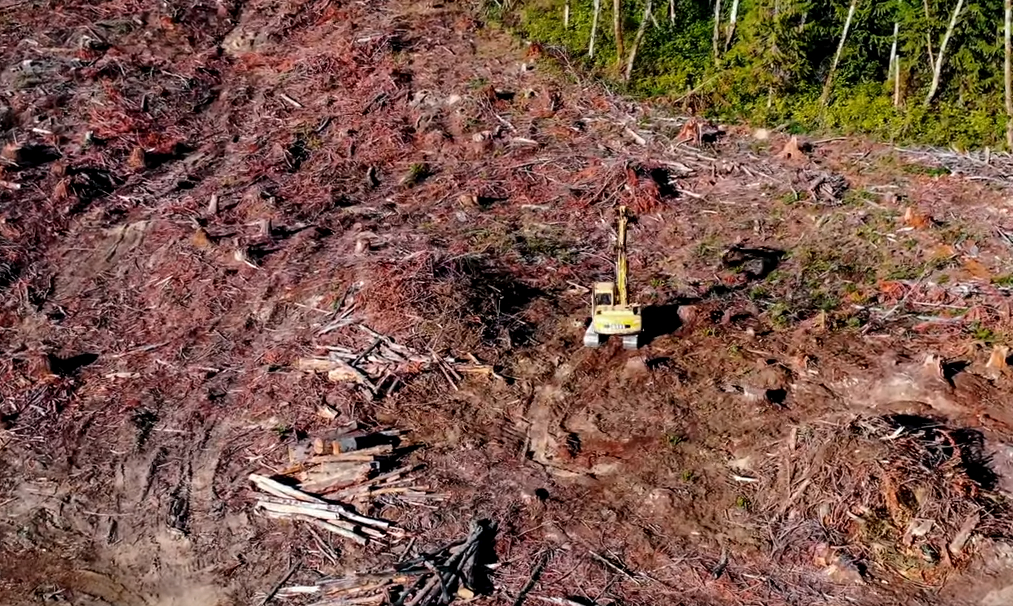
Are There Any Environmental Or Ecological Benefits To Removing A Tree?
When it comes to tree removal, it’s important to consider more than just the financial cost. Are there any environmental or ecological benefits to removing a tree? Depending on the situation, the answer can be yes. However there are several felling trees cutting pros and cons.
When a tree is removed, it can open up space for more sunlight to reach the ground. This can help to encourage the growth of other plants and trees, which can provide a habitat for wildlife. Additionally, removing an unhealthy or diseased tree can help to prevent the spread of disease to other trees in the soil area.
Removing a tree can also help to improve the visual appeal of a landscape. It can create a more aesthetically pleasing view, which can be beneficial for homeowners or business owners. Removing a dead or dying tree can also reduce the chances of it falling and causing damage to property or people.
On the other hand, removing a tree can have negative environmental impacts as well. Taking away a tree’s canopy can reduce the amount of oxygen it produces, which can have negative consequences for the surrounding area. Additionally, removing a tree can remove food and shelter for certain species of animals.
Ultimately, the decision of whether to remove a tree should be made on a case by case basis. It’s important to consider all of the potential pros and cons, and to make sure that the environment is taken into consideration. Removing a tree can have both positive and negative impacts, so it’s important to weigh them carefully before making a decision.
Can I Remove A Tree Myself Without Professional Help?
Now that we know there can be environmental or ecological benefits to removing a tree, you may be wondering if you can take care of the job yourself without professional help. The answer is yes, but it’s important to understand that tree removal is a dangerous job. It requires skill, knowledge, and the right tools, so it’s not something that should be taken lightly.
If you decide to try and remove a tree on your own, it’s important to do your research first. Make sure you understand the risks and the types of tools and techniques you’ll need to use. It’s also a good idea to check with your local authorities to see if you need to get a permit before attempting to remove a tree.
When it comes to the actual task of removing a tree, you’ll need to have access to the right tools and safety equipment. A chainsaw, safety glasses, and protective gloves are essential, and you’ll also need to have a good understanding of how to use them safely. If you’re unfamiliar with the process, it’s best to leave the job to a professional.
Ultimately, whether you choose to remove a tree yourself or hire a professional, safety should be your number one priority. Tree removal can be a dangerous job, so make sure you understand the risks and take the necessary precautions before attempting the task. With the right tools, knowledge, and safety equipment, you’ll be sure to get the job done safely and effectively.
Are There Any Potential Legal Implications To Removing A Tree?
Tree Pruning & Crown Reduction
When it comes to tree removal, it’s important to consider the potential legal implications of taking matters into your own hands. Depending on where you live, there may be regulations in place that govern tree removal on your property. Therefore, it’s important to do your research first and to familiarize yourself with any local ordinances.
In some areas, you may require a permit to cut down a tree. This will typically depend on the size of the tree as well as its location. If the tree is located in a public space or is owned by someone else, then you may need to get permission from the relevant parties before taking any action.
In other cases, you may need to pay a fee or a fine if you remove a tree without following the local regulations. It’s important to be aware of these potential legal implications and to make sure that you don’t break any laws.
At the end of the day, it’s important to be aware of your rights when it comes to removing a tree from your property. Doing your research first and understanding the potential legal implications can help to ensure that you don’t get into any trouble. So, before you start any tree removal project, make sure you’re up to date on the regulations in your area.
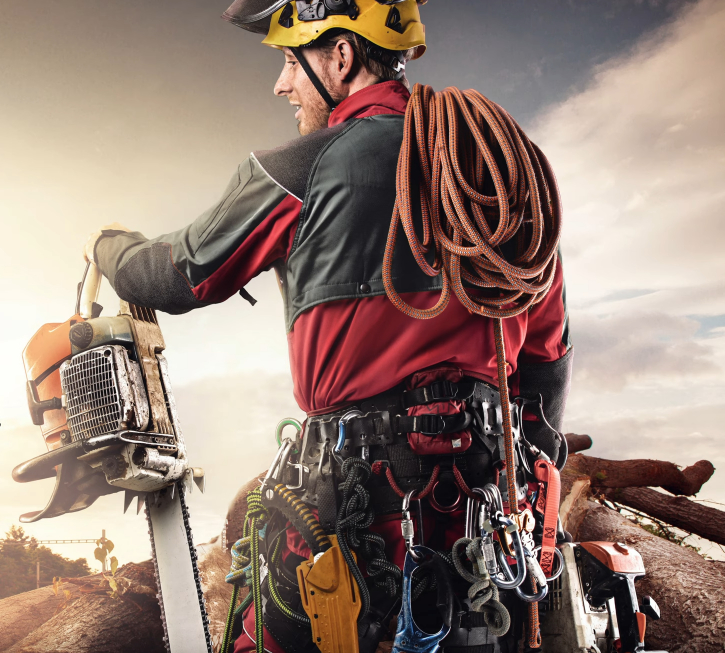
Are There Any Regulations Or Permits That Need To Be Obtained Prior To Tree Removal?
When it comes to tree removal, there are certain regulations and permits that must be obtained in order to do so legally. Depending on where you live, different laws and permits may apply to tree removal. Some states require a permit before any tree removal can take place, while other states may have regulations that limit the number of trees that can be removed. It’s important to check with your local municipality to make sure you are complying with the relevant regulations and permits.
If you are thinking about removing a tree from your property, I recommend doing your research beforehand. You’ll want to make sure that you have all of the necessary permits and that you are following any applicable laws. Depending on the size and age of the tree, you may also need to hire a certified arborist or tree removal specialist.
In addition to permits and regulations, you will also need to consider any potential legal implications of removing a tree. If the tree is located on your property, then it’s likely that you are responsible for any damage that may be caused by the removal. This includes any damage to the property of your neighbors, as well as the potential destruction of any wildlife or habitats that may be impacted.
It’s also important to consider any potential environmental implications of tree removal. Depending on the species of tree, there may be certain environmental regulations that need to be followed. For example, some trees may be subject to protection under the Endangered Species Act, so you’ll need to check with your local government to make sure that you are not violating any laws.
Overall, it’s important to take the time to research any regulations or permits that need to be obtained prior to tree removal. This will help to ensure that you are following the law, and that any potential legal or environmental implications are taken into consideration. Doing so will help to ensure that your tree removal is done in a safe and responsible manner.
Conclusion
Tree removal is a complex process, and there are many different techniques to consider. Each technique has its advantages and drawbacks, and the best choice depends on a variety of factors.
When it comes to tree removal, safety is the number one priority. It is important to consider the size and location of the tree, as well as the environmental impact of the chosen method. Hiring a certified tree removal specialist is the best way to ensure the job is done correctly and safely.
Ultimately, the pros and cons of different tree removal techniques should be weighed carefully. With a bit of research and the help of a professional, you can make an informed decision and keep your property safe from potential tree-related hazards.
References:
Tree Climbing Techniques: The Benefits and Drawbacks of Different Styles
Selective Logging: Methods, Specifics, And Impacts
Benefits And Drawbacks Of Tree Removal
